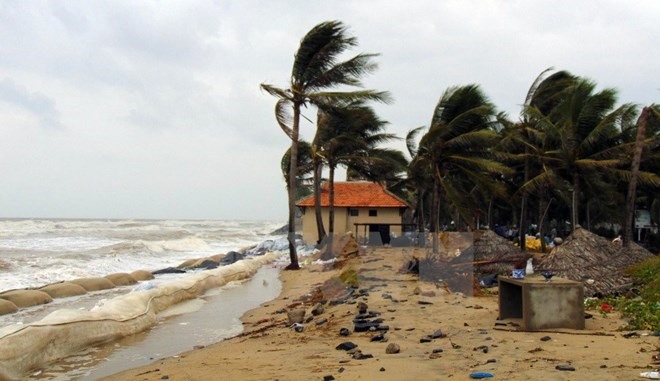Storms forecasted to arrive early in the East Sea
Storms and tropical depressions are likely to arrive earlier and with more frequency in the East Sea than in the average monsoon season, the National Centre for Hydro-meteorological Forecasting (NCHMF) said.
 |
| Serious erosion in the Cua Dai Beach of Hoi An, Quang Nam Province, took place in 2016, due to climate change, resulting in rising sea level, eating away the coastline. — VNA/VNS Photo Do Truong |
However, in the next 3 months, there is little chance of storms and tropical depressions making landfall.
In April and May, the transition period between dry and rainy seasons, adverse phenomenon such as thunderstorms, lightning and whirlwind, hail will appear in higher frequency over the whole country, especially in the northern region, central highlands and the southern region.
Sea waves and sea level, which have enjoyed a peaceful period this year thanks to rather weak and infrequent cold snaps coming from the north, will get stirred up in May, due to early storms.
ENSO, short for El Niño-Southern Oscillation – the combination of El Niño and La Niña, which is “a naturally occurring phenomenon that involves periodic fluctuation in sea surface temperature and air pressure in the equatorial Pacific Ocean,” will complicate forecasts.
In 2017 January and February, record high temperature has occurred in the northern winter season, while unusually high rainfall hit the southern and central highlands regions.
From March to May, the weather forecast indicates a 0.5-1 degree Celcius higher than average temperature amidst reduced and belated rainfall compared to other years’ period in the north and northern central region.
The agency also predicted a shortage of water – even drought – in some localities, such as the northeast region, central provinces of Thanh Hoa and Nghe An, and Gia Lai, Dak Lak in the central highlands.
Salinisation threats posed to the southern region in the coming dry season will be on the same level as the 2013-2014 period, meaning a relief from the 2016 issues. Peak salinisation might come in late March.
(Source: VNS)